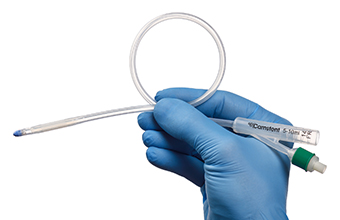A bacteria resistant polymer coating applied to catheters, developed in a collaboration between Camstent and the University of Nottingham, is producing positive results in its first in-man clinical trials.
 A Camstent coated catheter
A Camstent coated catheter
The pilot study compared 10 Camstent coated catheters against 12 uncoated silicone catheters, and the results showed a reduction of biofilm formation and mineralisation for the Camstent coating. Upcoming studies will compare larger numbers of catheters over longer time periods. These pilot study results are a promising step towards reducing the number of hospital associated infections, of which urinary catheters make up 38% of cases*.
The coating was originally discovered at the University of Nottingham*, and the university have since been working in tandem with Camstent to utilise and develop the finding. Since the material does not kill the bacteria, but instead deters the formation of bacterial biofilm, there is reduced contribution to the creation of antibiotic resistant super-bugs, which currently costs the NHS £1 billion annually**.
* Hook et al. Combinatorial discovery of polymers resistant to bacterial attachment. Nature Biotechnology, 2012.
**Source and further information: https://www.clinicalservicesjournal.com/story/28781/positive-results-for-bacteria-phobic-catheter
Posted on Thursday 21st March 2019